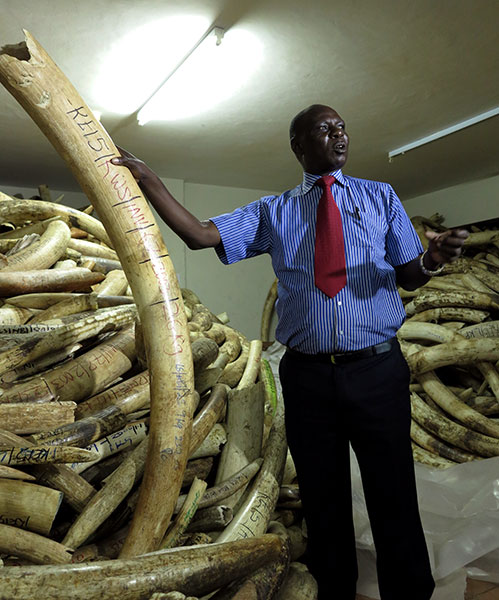
. K. Lubia, assistant director of enforcement and compliance affairs at the Kenya Wildlife Service, displays ivory in a storage facility. CHEN LIANG/CHINA DAILY
First person: An emotional journey into the heart of darkness
As a journalist, I always try to keep an emotional distance with my sources and interviewees. During my recent trip to Kenya with members of the International Fund for Animal Welfare's China-Africa Wildlife Ambassadors initiative, I found maintaining that distance was difficult at times, especially because my focus was not on humans, but an amazing animal-the African elephant.
Early one morning, we spoke with some of the officials responsible for wildlife protection, who presented us with dry facts and figures about the plight of the world's largest land animal as a result of the illegal trade in ivory.
By noon, we were at an "orphanage" for elephant calves in Nairobi, watching dozens of them chase their human nurses for milk and interact with the visitors, unaware that that their situation was the work of human poachers who killed their parents for their tusks. Faced with these adorable animals, it's easy to become emotional.
Another day, we visited the Kenya Wildlife Service's fortified underground storehouse, where the country's stock of illegal ivory is held. The piles of tusks, each one bearing information indicating the date and location it was poached, and weight and length, were truly, horribly impressive.
"The thing that has made the biggest impression on me here is the smell, the bloody smell that fills the rooms," said Zhang Yue, a wildlife ambassador and popular anchor on China Central Television. Her feelings echoed my own.
In the evening of the same day, we met Huang Hongxiang, a Chinese national who has lived in Nairobi for two years. In August, posing as an ivory dealer from Hong Kong, the 28-year-old wore a concealed camera supp-lied by Austrian documentary maker Richard Lakini to shoot secret footage of poachers and the illegal trade in Uganda, East Africa.
It was hard to believe that this rather timid man, who looked like a fresh-faced graduate, had fooled hardened poachers. "You don't look like a cunning businessman. How could the poachers trust you?" I asked.
"Well, they don't know any Chinese who won't buy products made from elephant ivory," he said. "If you are Chinese, they trust you," Huang replied.
It's certainly not easy to control one's emotions when faced with an answer like that.
By Chen Liang


















































